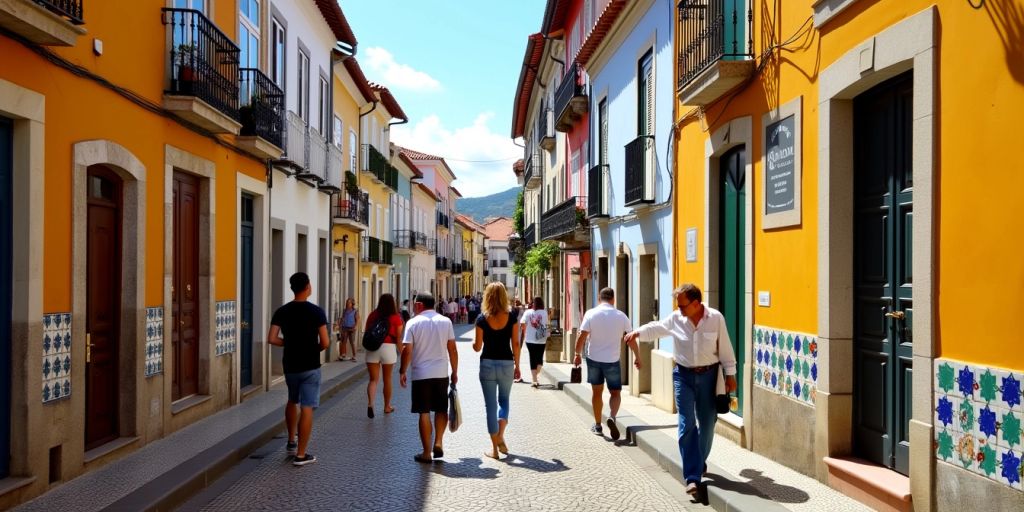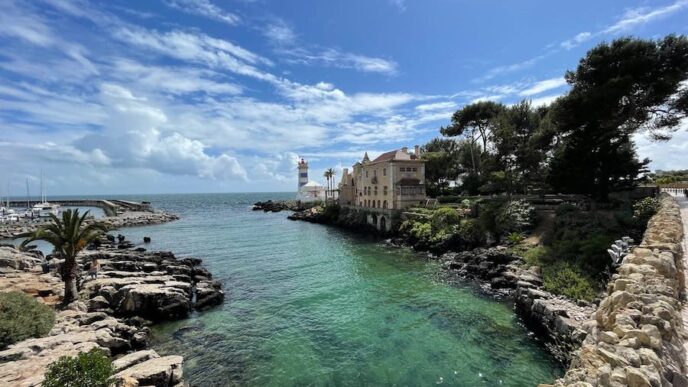Language Essentials for Learning Portuguese in Portugal
Foundational Phrases and Expressions
To start speaking Portuguese, learn these essential phrases:
- Hello: Olá
- Thank you: Obrigado (if male) / Obrigada (if female)
- Please: Por favor
- Goodbye: Adeus
- Excuse me: Com licença
These phrases will help you in daily conversations and interactions.
Pronunciation Tips and Tricks
Pronunciation can be tricky. Here are some tips:
- Practice nasal vowels: Sounds like “ã” and “õ” are unique to Portuguese.
- Roll your “r”: This sound is common in many words.
- Listen to native speakers: Mimic their pronunciation for better results.
These techniques will improve your speaking skills.
Basic Grammar Rules
Understanding grammar is key. Focus on these basics:
- Verb conjugation: Learn how to change verbs based on the subject.
- Noun gender: Remember that nouns are either masculine or feminine.
- Sentence structure: Typically follows a Subject-Verb-Object order.
Mastering these rules will enhance your communication.
Remember, learning Portuguese is a journey. Embrace the process and enjoy the experience!
Cultural Immersion: Embracing Portuguese Etiquette and Social Norms
Understanding Portuguese Etiquette
- Greet with a handshake or a kiss on both cheeks.
- Always say “por favor” (please) and “obrigado/a” (thank you).
- Respect personal space; don’t stand too close.
Navigating Social Situations
- Be punctual; arriving late is considered rude.
- Engage in small talk before discussing serious topics.
- Avoid sensitive subjects like politics or religion initially.
Common Customs and Traditions
- Enjoy meals with family; it’s a cherished tradition.
- Participate in local festivals to connect with the culture.
- Try traditional dishes like bacalhau and pastéis de nata to embrace local flavors.
Exploring Portugal: Must-Visit Locales for Language Learners
Hidden Gems in Lisbon
- Alfama District: Wander through narrow streets and practice your Portuguese with locals.
- LX Factory: A creative hub where you can find shops and cafes to engage in conversations.
- Miradouro de Santa Catarina: Enjoy stunning views while chatting with fellow learners.
Cultural Hotspots in Porto
- Ribeira District: Experience vibrant street life and try speaking with vendors.
- Livraria Lello: Visit this famous bookstore and discuss literature with other book lovers.
- Serralves Museum: Attend exhibitions and join guided tours to practice your language skills.
Scenic Destinations for Practice
- Douro Valley: Take a wine tour and converse with vineyard staff about local wines.
- Sintra: Explore palaces and gardens while practicing your Portuguese with tour guides.
- Algarve Beaches: Relax and meet fellow travelers to share experiences in Portuguese.
Effective Language Learning Strategies in Portugal
Utilizing Language Courses and Tutors
- Enroll in a structured course to learn step by step.
- Find a local tutor for personalized guidance.
- Join group classes for social interaction and practice.
Engaging in Language Exchange Programs
- Connect with native speakers through language exchange.
- Use platforms like iTalki or Tandem to find partners.
- Share cultural experiences while improving your speaking skills.
Incorporating Technology and Apps
- Download language apps for interactive learning.
- Use podcasts to improve listening skills.
- Track your progress with quizzes and exercises.
To make your Portuguese learning more effective, start using recall techniques in your study sessions. Try repeating phrases to help them stick in your memory. This method can accelerate your learning and make it more enjoyable!
Supplementary Resources for Mastering Portuguese
To enhance your Portuguese skills, consider using various supplementary resources. These tools can make learning more effective and enjoyable.
Recommended Textbooks and Study Materials
- Textbooks: Look for books like “Teach Yourself Portuguese”. They offer structured lessons.
- Workbooks: Use workbooks alongside textbooks for extra practice.
- Audio CDs: These help with pronunciation and listening skills.
Online Platforms and Free Courses
- Interactive Websites: Many sites offer free lessons and quizzes. They allow you to learn at your own pace.
- YouTube Channels: Find channels that teach Portuguese. They provide practical lessons and tips.
- Podcasts: Listen to Portuguese podcasts for immersive learning.
Interactive Tools and Exercises
- Language Apps: Use apps for vocabulary and grammar practice. They often include games to make learning fun.
- Online Forums: Join communities where you can ask questions and share experiences.
- Language Exchange: Connect with native speakers to practice conversational skills.
These resources can significantly boost your learning journey. They provide practical examples and additional practice opportunities. Embrace these tools to master Portuguese effectively!
Connecting with Locals: Practical Tips for Real-World Conversations
Finding Conversation Partners
- Join local language meetups to meet native speakers.
- Use online platforms like iTalki or Tandem.
- Connect with friends who speak Portuguese.
Participating in Local Events
- Attend cultural festivals to practice your skills.
- Join community classes or workshops.
- Volunteer for local organizations to engage with residents.
Using Portuguese in Daily Life
- Practice speaking at shops or cafes.
- Label items in your home with their Portuguese names.
- Try to think in Portuguese during daily activities.
Engaging with locals helps you learn faster. It also builds confidence. Remember, making mistakes is part of the process!
Overcoming Challenges in Learning Portuguese
Common Mistakes and How to Avoid Them
- Mixing up verb tenses: Practice each tense separately.
- Mispronouncing words: Focus on sounds unique to Portuguese.
- Using incorrect articles: Learn gender rules for nouns.
Staying Motivated and Consistent
- Set small, achievable goals.
- Reward yourself for progress.
- Join a language group for support.
Seeking Support and Feedback
- Find a language partner for practice.
- Use online forums for questions.
- Attend local language events for real-world experience.













